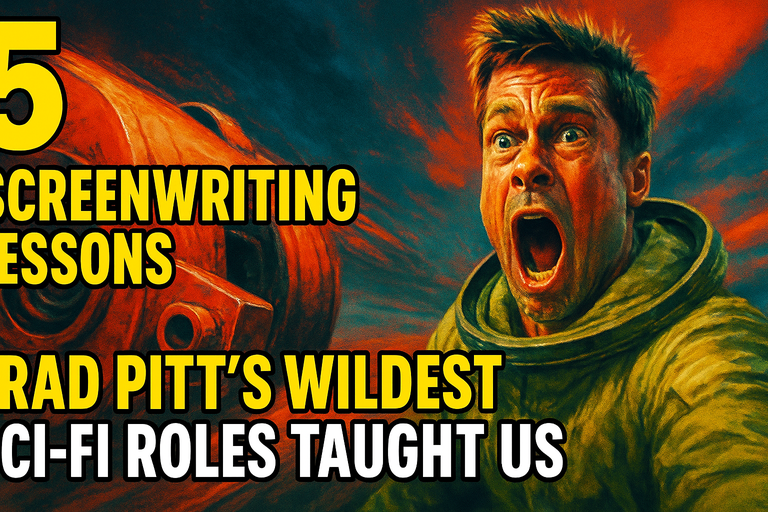- Posted on

Picture this: Brad Pitt, time-traveling in a tattered coat, mumbling about the apocalypse in '12 Monkeys.' Or, if you prefer, Brad Pitt aging backward (and, somehow, forward?) in 'The Curious Case of Benjamin Button.' What do all these offbeat roles have in common—besides Brad's jawline that seems to defy all known physics?
They’re all part of Gizmodo’s recently ranked list of Brad Pitt’s most memorable sci-fi film performances—and guess what? Each bizarre Pitt odyssey contains screenwriting secrets that most script gurus won’t tell you, and that Hollywood itself seems allergic to learning.
Buckle Up: The Sci-Fi Brad Pitt Teaching Mandate
First, let’s address the asteroid in the room: Why should you—a rising storyteller, script doctor, or idea-haver—care about Brad Pitt’s space shenanigans? Because they’re masterclasses in creative risk, character building, and narrative rule-breaking. Even Pitt’s wildest roles have lessons for any writer looking to push boundaries.
Ready to rocket into today’s five cosmic screenwriting commandments from the Pitt-verse? Let’s blast off:
1. Go All-In on Character Quirks (12 Monkeys)
Frankly, if your time traveler isn’t weird, are you even trying? ‘12 Monkeys’ serves up Pitt as Jeffrey Goines, a manic, unpredictable eco-activist with a speech pattern that’s part Shakespeare, part avant-garde performance art.
- Lesson: Don’t be afraid to amp up your character’s quirks to eleven.
- Why it matters: In a flood of cookie-cutter protagonists, the Jeffrey Goines of your script is what gets readers (and actors!) talking. Give your characters strange habits, odd beliefs, and rhythms all their own.
- The Pitt Effect: Goines is unforgettable, and so is your script, when character is king.
Open Loop: But how do you keep those quirks believable? Hold that thought—we’ll get there in tip #3!
2. Play With Time and Perspective (Benjamin Button & Ad Astra)
Pitt as a man aging backward should’ve been a punchline. Instead, it’s an Oscar-nominated meditation on mortality. And in 'Ad Astra,' his cosmic daddy issues play out across light-years, with time dilated and fragmented.
- Lesson: Don’t just tell stories—play with how time flows.
- Try this: Start your story at the end, chop it up Pulp Fiction-style, or mess with memory and unreliable narrators.
- Hollywood, take note: Audiences are smarter than we think. Give them the puzzle pieces—and let them build the picture.
3. Ground the Absurd with Emotional Truth (Fight Club, Ad Astra)
‘Fight Club’ isn’t technically sci-fi, but its twisty, mind-bending narrative sure feels like a trip through reality’s funhouse mirror. Pitt’s Tyler Durden is equal parts myth and raw nerve.
- Lesson: No matter how wild your premise, tether it to real emotions.
- Challenge: Next time you brainstorm a gonzo idea, ask: “How does this speak to loneliness, fear, or longing?”
- Payoff: Even the strangest worlds land if readers care about what’s at stake for their heroes.
(Remember tip #1’s quirks? Here’s the answer: It’s the emotional bedrock—loss, hope, anger—that sells them as real.)
4. Subvert Genre—And Expectations (Meet Joe Black)
Who says the Grim Reaper can’t be charming? Pitt’s ‘Meet Joe Black’ performance blends supernatural fantasy with rom-com tropes, proving that mashing genres is often more memorable than coloring inside the lines.
- Lesson: Don’t settle for predictable. Sneak a love story into your space opera, or drop existential comedy into your dystopian future.
- Bonus: It keeps your script surprising—for both readers and execs who think they’ve seen it all.
5. Trust Your Audience to Follow the Weird (All of the Above)
Here’s the best-kept secret about Brad Pitt’s sci-fi resume: None of these films spoon-feed their meaning. They trust the audience to ride the wave, to piece together fractured timelines, to accept talking with Death over peanut butter.
- Lesson: Write up, not down. Embrace ambiguity. Give readers space to think.
- Meta-moment: Isn’t that what all great storytelling should do?
Final Draft: What Pitt’s Sci-Fi Really Teaches Us
If Brad Pitt’s career is a masterclass in anything, it’s that the boldest stories belong to the storytellers who dare. It’s about the risks you take with structure, character, and tone—no matter how many studio execs quietly back out of the room.
At The Infinite Dude Media’s digital HQ, storytellers gather to swap scripts, push creative limits, and encourage each other’s inner oddball. So next time you’re prepping that world-building epic or time-bending fever dream, remember: There are communities rooting for your wildest scripts. (And yes, maybe for your inner Brad Pitt, too.)
In the end, what’s riskier: Playing it safe, or leaving audiences with something unforgettable?
Share your own Pitt-inspired sci-fi journeys in the comments, or tell us—which genre mashup would you like to see next?